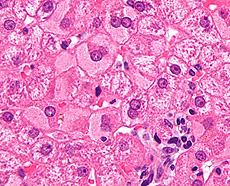The ABCs of viral hepatitis
 |
| Hepatocytes as seen in chronic hepatitis B. Everyone, and travelers especially, should be vaccinated for hepatitis. Image: Wikimedia Commons |
I often get questions about vaccinations from individuals planning to travel, and most of these are about hepatitis, the general term for liver inflammation.
In this case the inquirers are asking about protection from viral hepatitis, as contrasted with drug-, toxin- or alcohol-induced hepatitis. When the liver becomes inflamed, it cannot effectively clear toxins, the body's waste products or some medications. Urine may become dark as the kidneys attempt to clear these items. Skin, eyes and nail beds may become yellow (dark-complexioned individuals may notice only the latter two). The end result is fatigue and many body system stresses.
Hepatitis A is a concern in developing countries and in geographical areas with a significant number of infected individuals, since they may be handling food or contaminating water. Even some of the best restaurants or hotels in these areas may employ infected individuals who fail to wash their hands after using the restroom, putting patrons at risk.
Hepatitis A can cause temporary liver inflammation and can land you in the hospital, but fortunately it does not have a chronic stage. WebMD has good advice from a Centers for Disease Control physician on how to avoid infection when traveling abroad. Hepatitis A is typically eradicated completely by the body's defenses.
Hepatitis B is primarily blood-borne. Transfusions, shared sharps (such as razors, needles, even toothbrushes) and unprotected sex involving an infected individual all put you at risk, so avoid such activities to reduce your risk of infection. Hepatitis B can cause chronic disease.
The medical community has vaccines for the A and B varieties of hepatitis. The hepatitis C virus, discovered in 1989, has eluded vaccine development so far. Hepatitis C, like hepatitis B, can cause chronic illness and raise your liver cancer risk. You can avoid it by taking some of the same measures for avoiding hepatitis B.
In scheduling hepatitis vaccinations before trips abroad, planning weeks to months ahead is best. Still, there will be times when travelers must take trips on short notice. The CDC says there is some protection within weeks of the vaccination, so last-minute vaccinations may be worthwhile. The hepatitis vaccines are offered as both separate and combination shots. There is some evidence that the combination vaccine may confer immunity faster and may be more effective in an accelerated schedule, in which shots are given closer together in time than typically advised.
I was required by the U.S. Navy and my profession to get vaccinated. You should seek out hepatitis vaccinations because it will protect you when planning a visit to an at-risk destination.
The Medical Office researches health issues in non-U.S. destinations for Fermilab business travelers. This site has further information on vaccinations and links to risk assessments for travelers.
—Brian Svazas, M.D., M.P.H.
|